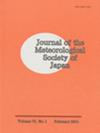基于CIE XYZ色系的Himawari-8真彩色图像再现方法
IF 1.6
4区 地球科学
Q3 METEOROLOGY & ATMOSPHERIC SCIENCES
引用次数: 13
摘要
日本气象厅(JMA)新一代Himawari-8和Himawari-9地球同步气象卫星上的高级Himawari成像仪(AHI)的三个可见波段的组合,使产生真彩色图像成为可能。人类分析人员可以直观地理解真色,并且有利于监测地表和大气特征。当应用于地球静止平台的频繁观测时,它特别有用。在本文中,我们报告了基于国际照明委员会(CIE) 1931 XYZ色彩系统的色彩再现方法在图像渲染中的应用。这种方法允许考虑卫星和输出设备之间的原色(RGB)差异,这反过来又导致再现颜色的差异。将AHI观察到的RGB信号转换为与设备本身无关的XYZ三刺激值,然后通过3 × 3转换矩阵重新转换为输出设备的RGB信号。本文还介绍了一种评估XYZ值准确性的客观技术。评价表明,AHI原生RGB波段的组合对于获得XYZ值是次优的,而将绿色波段替换为中心波长约为0.555µm的伪波段的组合是最优的。伪波段以现有的可见光和近红外波段作为预测变量,通过回归生成。使用这种方法产生的图像被称为真彩色再现(TCR)。这种方法适用于在可见光到近红外光谱范围内具有多个波段的其他卫星,并且它有可能朝着生产标准化的独立于传感器的真彩色图像的方向发展。本文章由计算机程序翻译,如有差异,请以英文原文为准。
True Color Imagery Rendering for Himawari-8 with a Color Reproduction Approach Based on the CIE XYZ Color System
The combination of three visible bands of the Advanced Himawari Imager (AHI) aboard Japan Meteorological Agency’s (JMA) new-generation Himawari-8 and Himawari-9 geostationary meteorological satellites enables the production of true color imagery. True color is intuitively understandable to human analysts and beneficial for monitoring surface and atmospheric features. It is particularly useful when applied to frequent observations from a geostationary platform. In this article, we report on an application of a color reproduction approach based on the International Commission on Illumination (CIE) 1931 XYZ color system to imagery rendering. This approach allows the consideration of primary color (RGB) differences among satellite and output devices, which in turn cause differences in the colors reproduced. The RGB signals observed by the AHI are converted to XYZ tristimulus values, which are independent of the devices themselves, and then reconverted to RGB signals for output devices via the application of 3 × 3 conversion matrices. This article also covers an objective technique for the evaluation of the accuracy of XYZ values. The evaluation indicated that the combination of AHI native RGB bands is suboptimal for obtaining XYZ values as is, whereas a combination in which the green band is replaced by a pseudo band with a central wavelength of around 0.555 µm is optimal. The pseudo band is generated via regression with existing visible and near-infrared bands as predictor variables. The imagery produced using this approach was termed True Color Reproduction (TCR). This approach is applicable to other satellites that have several bands in the visible to near-infrared spectral range, and it has the potential for development toward the production of standardized sensor-independent true color imagery.
求助全文
通过发布文献求助,成功后即可免费获取论文全文。
去求助
来源期刊
CiteScore
6.70
自引率
16.10%
发文量
56
审稿时长
3 months
期刊介绍:
JMSJ publishes Articles and Notes and Correspondence that report novel scientific discoveries or technical developments that advance understanding in meteorology and related sciences. The journal’s broad scope includes meteorological observations, modeling, data assimilation, analyses, global and regional climate research, satellite remote sensing, chemistry and transport, and dynamic meteorology including geophysical fluid dynamics. In particular, JMSJ welcomes papers related to Asian monsoons, climate and mesoscale models, and numerical weather forecasts. Insightful and well-structured original Review Articles that describe the advances and challenges in meteorology and related sciences are also welcome.

 求助内容:
求助内容: 应助结果提醒方式:
应助结果提醒方式:


